Red
Easter
Easter has no fixed abode; this most
important movable feast of the Orthodox Christian year flies
like a shuttle between March and May and weaves the diverse
important dates into a single metaphysical narrative. In the
memorable year 2000, it coincided with the Western Easter
proclaiming Christendom’s underlying bedrock unity. Last year,
Good Friday fell on April 9, the Deir Yassin Massacre Day, when
apostles’ children were slaughtered by Jewish terrorists in the
land of Christ. This year, Resurrection Sunday comes on May Day,
weaving back the unnecessary tear between the Reds and the
Christ. The Russians, amongst whom I celebrate today, christened
it Krasnaya Pascha, “Red Easter”.
In this unique country – nay, civilisation, -
thousands of men and women stand up for the all-night-long
Easter service and in the morning join mass demos under the Red
banner. Thus for me, and for many Russians, May Day came as a
second, unexpected apotheosis of the Easter celebration.
I came to Russia for the last weeks of their
Lent and for Easter. The Spring was unusually long and cold;
until recently, white snow covered the eternally green boughs of
the pines and the naked white bodies of birches in the forest.
Thick ice allowed fishermen to drill holes and catch fish in the
frozen streams until mid-April. It was good: Russia is beautiful
like a bride in her white dress of snow and ice, while
rosy-cheeked and blue-eyed Russian girls in their modest fur
coats are irresistible on frosty days. And the churches with
their multicoloured onions and domes are embellished with
exquisite icons and frescoes.
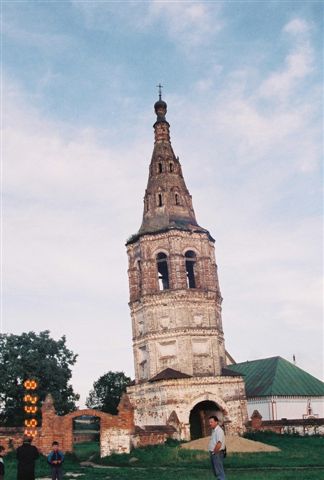 In
Soviet days they served as coal stores, hardware shops, or at
best, museums of atheism. Active churches were a rare thing. The
rest was so run-down that they inspired no interest -- just
dirty old structures ready to be demolished when a new bypass
has to be built. And a lot was demolished. Since 1991, the
Church embarked on a huge project of regaining surviving
churches and repairing them. The result is mind-boggling –
yesterday’s Cinderellas became today’s Princesses. I could not
recognise them – their old domes a-blazing with gold plating,
bells a-ringing, and interiors totally redone. The surviving
frescoes were lovingly restored, ruined ones were painted anew
in the traditional Byzantine style. The monasteries turned into
soldiers’ barracks or boarding schools for young delinquents
returned to their original purpose and many serious young and
spiritual Russians take up the Orders. Even the long-demolished
Cathedral of St Saviour in Moscow – a site of a swimming pool in
Soviet days – was rebuilt. Thus the Russians succeeded where the
Jews failed: they did rebuild their Temple. In
Soviet days they served as coal stores, hardware shops, or at
best, museums of atheism. Active churches were a rare thing. The
rest was so run-down that they inspired no interest -- just
dirty old structures ready to be demolished when a new bypass
has to be built. And a lot was demolished. Since 1991, the
Church embarked on a huge project of regaining surviving
churches and repairing them. The result is mind-boggling –
yesterday’s Cinderellas became today’s Princesses. I could not
recognise them – their old domes a-blazing with gold plating,
bells a-ringing, and interiors totally redone. The surviving
frescoes were lovingly restored, ruined ones were painted anew
in the traditional Byzantine style. The monasteries turned into
soldiers’ barracks or boarding schools for young delinquents
returned to their original purpose and many serious young and
spiritual Russians take up the Orders. Even the long-demolished
Cathedral of St Saviour in Moscow – a site of a swimming pool in
Soviet days – was rebuilt. Thus the Russians succeeded where the
Jews failed: they did rebuild their Temple.
The last days of the Holy Week were quite a
build up. The churches were full day and night; the believers
formed long queues to go to confession: the Russian church has
no booths for this purpose, and confession is a face-to-face
interview in a nave. Only after a three-day fast and confession
one may receive the communion done with bread and undiluted
wine, as in the church of Apostles. Besides the Communion, the
Orthodox church also practice pre-Paschal unction reserved in
the West only for the dying.
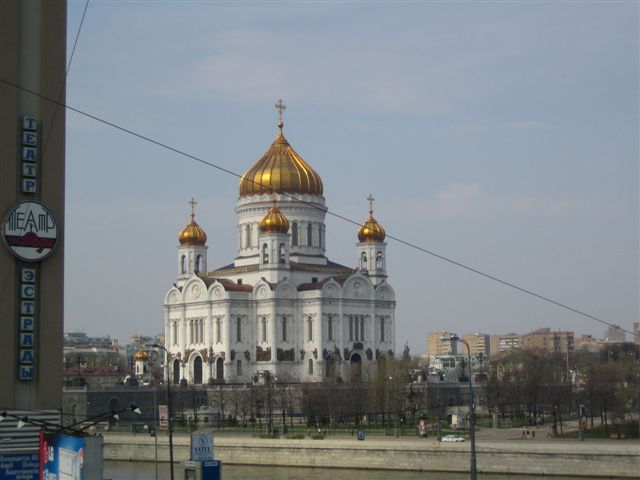
On Easter Saturday, Russian ladies baked
their delicious Easter cakes and brought them to be blessed by
the priest in the church, so in the afternoon the church
compound was scented by spices, raisins and fresh dough. It is
their custom to break the fast by eating these sweetish cakes
with cottage cheese.
The night-time Easter service was very long,
but people did not leave early – they felt it was the
much-expected culmination of their long and hard Lent. Indeed,
Orthodox Lent is very strict: even olive oil (do not even think
of dairy or fish) is permitted on Sundays only, while marital
joys are banished completely. I went to a church of a nearby
monastery, a vast structure built in the beginning of the 20th
century in Art Nouveau style with pre-Raphaelite frescoes, and
stood all night long, until the dawn, among throngs of smartly
dressed Russians with lit candles in their hand who answered the
priest calling out ‘Christ is Risen!’ with their thunderous
‘Indeed, He is Risen!’
And just a few hours later I stood opposite
the Bolshoy Grand Opera (where I was recently at the premiere of
a specially commissioned by the theatre new opera
Blumenthal’s Children, a fascinating and provocative
treatment of the iconoclast Sorokin’s writing by St Petersburg
composer Desyatnikov) in the May Day demo crowd, listening to a
Communist leader who repeated just the same call; and from under
the Red banners came a reply: “Indeed, He is Risen!”
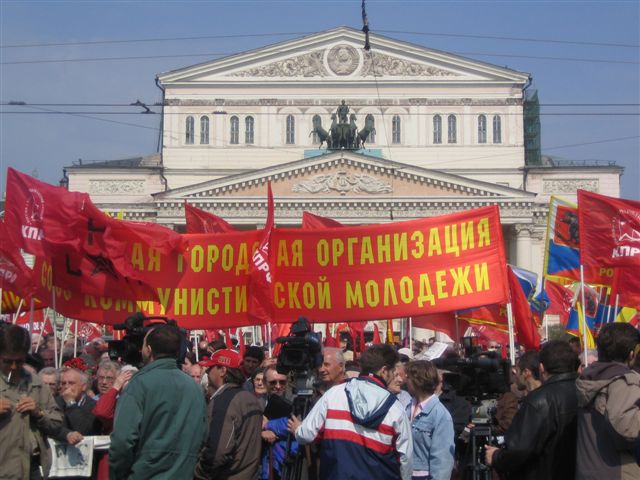
Paradox? Not really. Even universal faiths
have some local colour, and Russian Communism and Russian
Orthodox Church share the same background. On every turn of
their development, whether in their old Pravoslav Tsardom, or in
the Red Republic, the Russians who strove for the unity and
brotherhood of Man were motivated by compassion and acceptance
of “losers.” They consistently rejected Mammon. The Russians
despise money and material belongings; for them, poverty is a
welcome sign of an honest man rather than a mark of social
leprosy as in the West. They suspect rather than admire a
moneybag. The old adage of ‘the Spiritual East’ as opposed to
‘materialistic’ West still holds true: who does not like East,
does not love the Spirit.
Today, Russian Reds are reconciled with the
Church; the Communist Party members attend the services and
joined the Pravoslav tradition. Gennady Zuganov, the CPRF
leader, congratulated the demo with the May Day – and with
Christ’s Resurrection as well. Rogozin, the leader of a
breakaway Rodina faction, now a big party by its own right, was
even more eloquent in referring to Easter. As various Red and
nationalist parties and groups represent a clear majority of the
Russians, it is an important and a positive change from the days
when churches were dynamited and worshippers discouraged.
It is a good change, for the Reds’ loss of
power can’t be understood but in context of Russian spiritual
quest. The Russian Communists modernised Russia, they created a
society of mutual support. They could not give villas and
Cadillac cars to everybody, so they gave what they could.
Everybody had more or less the same: they had their safe and
assured employment, their free accommodation, free electricity,
telephone, heating, public transport.
But they forgot to attend to spiritual needs
of the Russians. They forgot the teleological ‘What for’. And
people can’t live without a purpose. This lack of purpose became
obvious when the pressing material needs of the people were
satisfied. The Russians accepted Communism – not in order to
live better; they had a greater goal of spiritual perfection.
The trouble began from the top: the de-spiritualised Soviet
elites of the last decades drifted to the right; they loved
Margaret Thatcher and Ronald Reagan, and had accepted the
neo-liberal world-view a long time before the collapse.
Indeed, in the West, the neo-liberals solved
the problem of “What for” by creating massive social insecurity:
people are not liable to think of spirit if they can be thrown
out of their homes by a bank. Gorbachev copied their solution
when he allowed the Soviet ship to capsize. He was supported by
the pro-Western reformers.
The West is full of variety and contains many
ideas and paradigms. But the Russian Westernisers were a
narrow-minded lot; they embraced the Chicago school of Milton
Friedman with fervour; and despised the Russian people, their
history and tradition. They privatised Russian national
property, sold it to the trans-national companies and tried to
integrate Russia as a supplier of raw materials. However, their
victory was not as final and conclusive as they thought.
There are clear signs of Russians reasserting
their history after the clean break of 1991. It is not only
churches lovingly restored and filled with worshippers; not only
restoration of historic names – thus Kalinin Avenue (named after
a Soviet leader) became again the Invention of the Cross street.
It was done by the winners of 1991. But the Soviet past is being
reintegrated, too. The great celebrations of V-day due on May, 9
are a sign of the change. The liberal reformers of 1991 asserted
that there was no difference between the Commies and the Nazis,
between Hitler and Stalin. They mocked the veterans saying “Pity
you weren’t defeated: we would live like Germans”. They forbade
celebrations of V-day: not out of love to Hitler, but because of
their hate to the Soviet anti-Mammonite past.
This year, every street in Russia bears some
congratulatory poster blessing the vets for their great victory.
Here again, it is not a sign of hate to Germany or to National
Socialism, but of reconciliation with the Soviet past. At the
May Day demo, Stalin was acclaimed by Zuganov and other
Communist leaders as ‘the father of the great victory’. There
were his portraits a-plenty. It’s not that the Russians miss the
Gulag or industrialisation; but Stalin and his rule are part and
parcel of Russian history. Likewise, the French Restoration
regime of Louis the Eighteenth called Napoleon ‘the Corsican
Monster’, but just a few years later, by 1840s, the late Emperor
regained his place in the Pantheon of France.
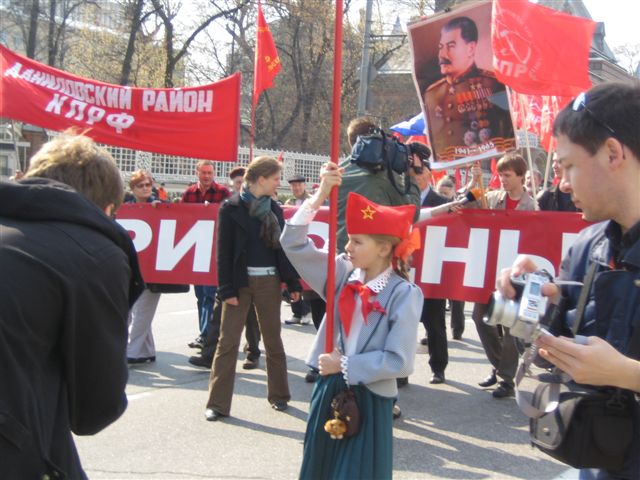
The struggle for Russia's future is far from
over; it has just started. Some people may think that this great
country became an irrelevancy, a rusty oil pipeline and a
consumer of Chinese goods and American ideas. But Russia is
alive: Russians write great books still unknown in the West.
Three books of the last decade, The Last Soldier of the
Empire by Alexander Prochanov, The Blue Lard by
Vladimir Sorokin and The Sacred Book of Werewolf by
Victor Pelevin are as enjoyable, challenging and uplifting as
Hundred Years of Solitude by Marquez. There are no
contemporary writers or books in the West of a similar stature.
In a properly arranged world, these treasures of spirit would be
considered among great achievements of mankind. Indeed, who
cares for oil – it is Russian writing that we should import!
Russians do read a lot. Another positive
change since the Soviet days is freedom of creativity and
publishing. In Soviet days, stifling Party control blocked
incoming ideas and books and stopped their creation in Russia.
Even revolutionary Marxist books were banned, unless written in
boring Sovietese. Now, in a tiny bookshop in a Moscow
Underground for a few roubles one can buy new editions of Guenon
and Joyce, Murakami and Pavic, St Augustine and Chesterton – and
certainly, the Russian writers and philosophers old and new,
with their fusion of metaphysics, theology and politics: from
pre-revolutionary Bulgakov, Florensky, Rozanov to contemporary
Alexander Dugin, Serge Averintsev and Alexander Panarin. I felt
myself as Gulliver in Brobdingnegg, the Land of Giants: there
are hundreds of Russians one can discuss most complicated
questions with and find oneself out of one’s depth.
Russians are aware of their problems and
think of new solutions. Their problems are our problems, too:
the Soviet collapse coincided with (or ushered in) the global
Ice Age of social deep-freezing. More and more people in the
once-protected West find themselves marginalised; the Third
World outpoured unto New York and London; compassion is
outlawed; spiritual search is non-existent.
The recently demised Russian thinker
Alexander Panarin believed that the Orthodox Christian paradigm
has a way to deal with the coming neo-liberal Ice Age by
bringing in the Christian Eros as the force to revitalise the
Universe. Russia may yet raise again the banner to summon the
defeated, the outcast, the disenfranchised, the discarded
against the new Masters of the World, he wrote.
In his view, Orthodox Russian Christianity is
different and can offer a solution to perplexed mankind because
it is centred on the Lady. Indeed, Her image occupies the place
usually preserved for the Cross in the Western churches. She is
often presented as the Queen sitting on the throne with the
crowned Child on Her lap. For the Russians, the Mother of God
represents Nature. She is divine, connected with the Spirit and
bears Him in Her womb. The Russians’ love to Christ who is
Spirit is not divorced from their love to the Lady who is Mother
Earth and their Compassionate Intercessor. God the Father, the
God of Old Testament, the God of Justice has very little
presence in the Russian universe.
If Dan Brown were to visit Russia, he would
never write his Da Vinci Code, for the female divinity is
not suppressed or replaced here. In his very American
bestseller, the Catholic Church tries to suppress the cult of
Mary Magdalene as it is afraid of femininity; while the Jews (of
all people) protect and guard Mary’s remains. In real life, Jews
have no female saints and dislike Our Lady even more than they
dislike Her Son, while the Church venerates the Lady and adores
the female saints. But Dan Brown had to fit his perfectly
normal, true and justified longing for the Earth-bound and
Spirit-connected Mediatrix into the Judaeo-American
neo-Calvinist picture of the world, where Jews are always right
and the church is always wrong. That is why he turned everything
upside down; the New York Times spread its fame and the
public bought it. In Russia, he wouldn’t be able to
misrepresent: here, the Lady reigns supreme, and the ideas of
Compassion and Connection to nature and spirit wait to be
unleashed.
II
Will it happen? Russia is at the crossroads.
While new-found freedom of creativity, publications and
religious freedom are very important achievements, probably they
could have been had without the great social cost the Russians
were forced to pay. Their national assets – from oil and gas to
land and factories – were privatised and taken over by a small
group of extremely well-connected oligarchs. Now Western
companies try and buy these assets. Russian industry is in poor
shape; de-industrialisation proceeds unhindered. Once an
advanced country of great science and modern industry, Russia is
being converted into a raw materials’ supplier. Though oil money
makes this decline relatively comfortable for many Russians, in
case of economic downturn catastrophe is inevitable.
Russians feel themselves threatened by the
aggressive US drive to acquire military bases and political
influence in the ex-USSR republics. The Orange revolution in the
Ukraine and the possibility of NATO forces entering this Slav
hinterland made the threat acute. Russian James Bonds, Putin’s
ex-colleagues from St Petersburg branch of the State Security,
are strongly represented in the state apparatus; usually such
people – like George Bush the Senior – are considered patriotic
chaps, but now the Russians are worried not only by their lack
of liberalism and corruption, but also by their inability to
meet the American challenge and their readiness to give in to
American demands, including the much discussed question of a US
presence at Russian nuclear facilities. The media is
concentrated in a few hands; though as opposed to the West,
there is a prominent state-owned media, but it is also quite
pro-Western or provides poor-quality entertainment.
At the May Day demo, the Reds demanded just
one hour a day on the state TV to be devoted to their
programmes: this exceedingly humble request is not likely to be
met. Meanwhile, TV broadcasts Swan Lake and concerts of rock
groups, while political discussion is kept under wraps. The Reds
and the Nationalists are unhappy with the regime, for it is not
doing enough to stop embezzlement, corruption, privatisation,
de-industrialisation and impoverishment of the people. Though
the regime took up some of their slogans, their words remain
words only and are not accompanied by action.
But the Reds and the Nationalists are not in
fighting shape. They were defeated in 1993, when Yeltsin shelled
the Parliament and took dictatorial powers. In 1996, the Red
leader Zuganov actually won the presidential election, but the
results were falsified, and Zuganov did not dare ‘to do a
Yushchenko’ and forcibly take what was his by right. Since then,
the Reds suffer from a certain weakness. This could change
because of an alliance with two outsider groups.
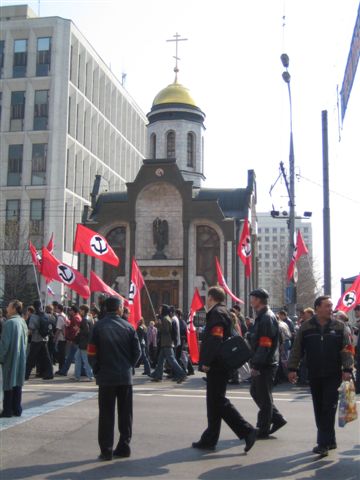 A
new force, National Bolsheviks led by Edward Limonov, a
charismatic poet, are anything but vegetarian. Very young,
practically teenagers or in their early twenties, the NBP made a
few spectacular actions: takeovers of ministries and even of the
President public reception office. They carry out an unusual
form of ‘terror’ – instead of bombs, they throw eggs, rotten
tomatoes and pies, slapstick-comedy-style, into politicians and
officials’ faces. The authorities were duly terrified and meted
out a five-year jail sentence for a well-aimed pie. Some forty
NBP young men and women are now in jail, but their readiness to
go into action where others just talk made them the cutting edge
of the opposition. They are courted now by Communists and
Liberals alike. At the May Day demo, Limonov was standing next
to Zuganov and Rogozin, leaders of much bigger parliamentary
parties. A
new force, National Bolsheviks led by Edward Limonov, a
charismatic poet, are anything but vegetarian. Very young,
practically teenagers or in their early twenties, the NBP made a
few spectacular actions: takeovers of ministries and even of the
President public reception office. They carry out an unusual
form of ‘terror’ – instead of bombs, they throw eggs, rotten
tomatoes and pies, slapstick-comedy-style, into politicians and
officials’ faces. The authorities were duly terrified and meted
out a five-year jail sentence for a well-aimed pie. Some forty
NBP young men and women are now in jail, but their readiness to
go into action where others just talk made them the cutting edge
of the opposition. They are courted now by Communists and
Liberals alike. At the May Day demo, Limonov was standing next
to Zuganov and Rogozin, leaders of much bigger parliamentary
parties.
The second force is quite different. These
are a mixture of liberals and neo-liberals. Their numbers are
tiny, their two parties could not even make it to the
Parliament. They also had a demonstration on May Day at some
distance from the main event; it was attended by two or three
dozen people. But they have a lot of money and strong positions
in the media, business and power structures. They are also
dissatisfied with Putin; they want to speed up privatisation,
open the country for foreign investors, privatise social
housing, bring in immigrants, remove limitations of free
movement within Russia, withdraw from Chechnya and win release
of UKOS boss Hodorkovsky.
Though their demands are the very opposite to
those of the Reds and the Nationalists, there is a tentative
coalition of these groups against the President. The Reds and
the Nationalists feel they can use some of the Liberals’ media
access and money to advance their agenda; the Liberals need the
masses mobilised by the Reds and the active fighters of NBP. In
return, NBP dropped its more radical slogans and now speaks for
greater freedom and democracy, for amnesty and general softening
of oppressive policing.
All sides in the new setup believe in their
ability to come out the top dog. The liberals are certain they
will eventually get the power in the land; but so do the Reds
and the Nationalists. The liberals have a precedent of the
Ukraine to go by. There, Communists and Nationalists supported
Yushchenko and installed pro-American neo-liberal regime. In
case of a revolution, the liberals will rely upon their
connection with the West, their media power and political
sophistication.
That is why some opposition forces in Russia
prefer to support the President as the lesser evil. These
supporters of the President include Left.ru, our Moscow friends,
a very good left group, and the “Eurasia” of Alexander Dugin, an
important and much admired Russian Orthodox thinker. They feel
that the revolution will be utilised by their enemies, and the
enemies of Russia. They say that they already tried to support
the liberal agenda in 1991, and this experience cured them from
entering such alliances.
Their opponents say that the President is
under American control anyway; he gave up the Russian positions
in Cuba and Ukraine, Georgia and Vietnam. He carries on
privatisation. Though he speaks like a Red nationalist, his
actions follow the liberal blueprint. They also feel that an
‘Orange’ revolution is inevitable: the Americans are fomenting
it, and ordinary people are dissatisfied with the regime. With
the support of the liberals, they can create instability and
hope for the best. “Let us enter the melee,” as Lenin used to
say, “and sort out our strategy later”.
Their slogan is ‘After February, October’ – a
reference to the events of fateful 1917. The Bolsheviks did not
overthrow the Tsar as is sometimes claimed; it was achieved by
the liberal Westernisers who seized power in February 1917 in
order to introduce full-blown capitalism in Russia; but the
Russian soul had a very strong faith-based rejection of Mammon.
Thus a few months later, in October 1917, the Bolsheviks kicked
the Mammonite liberals out. While now the liberals intend to
replicate their Ukrainian success, their tactical partners hope
to repeat the 1917 feat. It is not impossible: Even a few months
before it occurred, nobody expected the Bolshevik victory of
October 1917. Indeed, the liberal revolutionaries, the victors
of the February revolution, were well-positioned to rule. In
order to win, the Bolsheviks cooperated with the German General
Staff, with New York Jewish bankers and even with British
Intelligence – but in the end they dispatched their yesteryear
supporters without a thank you.
It is a dangerous game, but revolutions
usually are. Should we be satisfied with the ‘lesser evil’ or
may we try and gain the whole lot? I have no clear-cut answer.
While a return to Soviet Communism is as unlikely as restoration
of the Pravoslav Empire, the creative forces of the Russians may
still move mankind forward, out of its present impasse. The
divine spark in Man’s soul is not easy to extinguish, the Spirit
will win as sure as Christ is Risen.
Resurrection Sunday 2005, Moscow
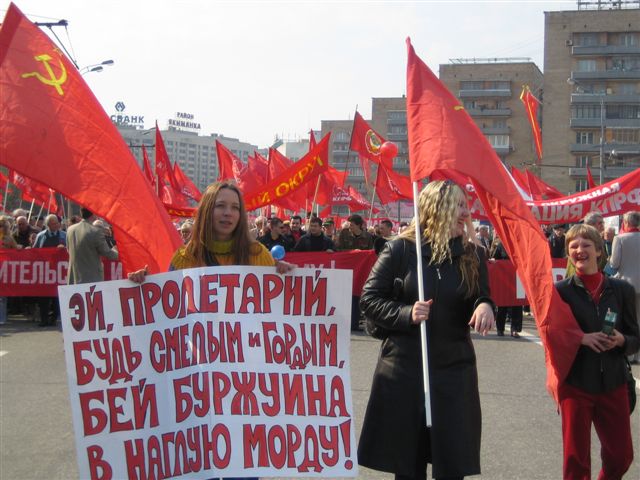
|